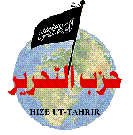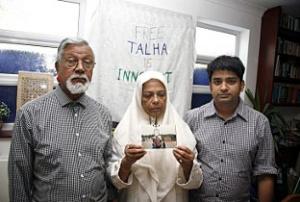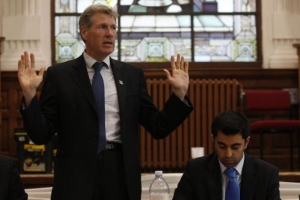 The counter-terrorism watchdog has recommended that the government back down on a manifesto promise to ban a British radical Islamist group.
The counter-terrorism watchdog has recommended that the government back down on a manifesto promise to ban a British radical Islamist group.
In a report submitted to parliament, David Anderson QC, the independent reviewer of terrorism legislation, says he does “not recommend changes to the system for proscription” that would allow the non-violent organisation Hizb ut-Tahrir to be banned.
As recently as May this year, David Cameron was explicit about his desire to see the group banned. In reply to a question from the Labour MP and former home secretary Alan Johnson, he said: “We are clear that we must target groups that promote extremism, not just violent extremism. We have proscribed one or two groups. I would like to see action taken against Hizb ut-Tahrir, and that review is under way.”
It is understood that Anderson’s review is likely to force the government into a U-turn over the issue. In his report Anderson said there were “formidable difficulties” to changing the proscription system, “which appear amply to justify the decision to stick with the status quo”.
In the aftermath of the 7 July attacks Tony Blair promised to ban HT but failed to get around legal obstacles. Currently only groups involved in violence or those directly “glorifying terrorism” can lawfully be banned.
In opposition, Cameron raised the issue during Gordon Brown’s first prime minister’s question time, asking: “We think it [Hizb ut-Tahrir] should be banned – why has this not happened?” In 2009 Cameron again upbraided Brown for not banning the group.
The Tory 2010 election manifesto was explicit in its promise to ban the group. It stated that a Conservative government would “ban any organisation which advocates hate or the violent overthrow of our society, such as Hizb-ut-Tahrir.”
Tory ministers have backed the pledge to ban the group. In 2009 the then shadow home secretary, Chris Grayling, said in a speech to his party conference: “I will immediately ban Hizb ut Tahrir.” In November of that year, the shadow education minister, Michael Gove, said a Tory government would proscribe the group, which has branches in dozens of other countries around the world.
Anderson told the Guardian he believed that the government would ultimately drop its plans to ban the group. “I’m not part of the government … but I’m aware that it has been very carefully looked at … and I’m not aware of any immediate plans to put them on the list,” he said.
Lord Carlile, the previous counter-terrorism reviewer, told the Guardian he was not aware of any plans to ban the group and believed that the government would be forced into a U-turn. “I don’t think anything is going to happen … I think the general view is that Hizb ut-Tahrir are best dealt with in public debate rather than by proscription,” he said.
A Home Office spokesperson said: “We welcome David Anderson’s thorough and considered report – his first on the operation of the terrorism acts since becoming the independent reviewer. He has raised a number of issues and made detailed recommendations which we will consider carefully and respond to formally in the autumn.”
Guardian, 19 July 2011
We look forward to The Spittoon denouncing David Anderson and Lord Carlile for having come to much the same conclusion about Hizb ut-Tahrir as Islamophobia Watch has.


 The counter-terrorism watchdog has recommended that the government back down on a manifesto promise to ban a British radical Islamist group.
The counter-terrorism watchdog has recommended that the government back down on a manifesto promise to ban a British radical Islamist group. The family of Tooting’s ‘forgotten’ terror suspect, who remains in jail without trial, are preparing to mark the fifth anniversary of his imprisonment.
The family of Tooting’s ‘forgotten’ terror suspect, who remains in jail without trial, are preparing to mark the fifth anniversary of his imprisonment. Glasgow’s Muslims are boycotting the city’s main airport and choosing to fly from Manchester because of perceived harassment from counter-terrorism officers, it was claimed last night.
Glasgow’s Muslims are boycotting the city’s main airport and choosing to fly from Manchester because of perceived harassment from counter-terrorism officers, it was claimed last night.